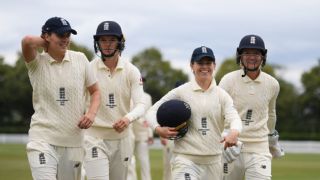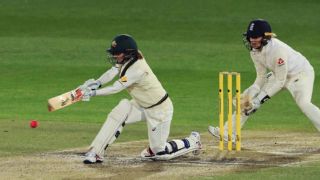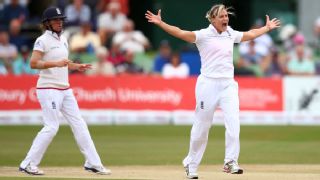|
Talk to any woman who has had a chance to play a Test match, and you'll be hard-pressed to find one who doesn't wish she could play more. But while there has arguably been no better time to be a woman playing cricket, the shift towards shorter formats within the game as a whole puts rare women's Test matches - like this week's Ashes contest between England and Australia - in a curious position. Is now the time to seize on recent growth in women's cricket and allow Tests to blossom, or will the long form be left to rot on the vine? Katherine Brunt, the 34-year-old England fast bowler who has played 11 Tests - eight of them against Australia, believes the nuances of Test cricket cannot be replicated anywhere else, and that's what she loves. "I absolutely love a Test match," Brunt said. "I think it's my favourite format and I think it's a favourite amongst a lot of our team, and there's a lot that haven't had the opportunity to be a part of it yet, so what I would say is, it's a game of patience and when the opportunity comes along to be in a fight, [it's important] that you know you're ready for it. "Because there can be quite long periods of play that are quite boring or not much is happening when the ball stops swinging or somebody's got themselves in. You've just got to stay ready for that, that opportunity to take the ball again or with the bat to get your head down and see your team through a tricky period. "It's full of ups and downs. Even though It's long and mind melting sometimes, you've got to stay ready, you've got to stay on top and be raring and ready to go for when you can make your impact on the game and that's what I love about it." Brunt could be describing any Test match - men's or women's - both can be "mind melting". But when women's matches enter a lull it seems to spark more controversy than when men's matches do. It's not often questioned whether men "should" be playing Tests because for them to play the purest, most traditional form of the game is accepted as a given. But while women's Test matches raise the excitement levels of the players, they can spark indifference and even opposition among observers. And a key factor is that women play so few of them. Unlike the men's game, Tests are not the "norm" for women - how can they be when one is played every two years or so? And the fact that women play so few is, of course, going to impact on the skill level. The latter point is not something the players shy away from. Tammy Beaumont scored 70 and 37 against Australia in 2017 - the most recent of her three Test appearances - where Australia's Ellyse Perry notched an astonishing 213 not out at North Sydney Oval but the tourists held out for a draw on the back of captain Heather Knight's unbeaten 79 off 220 balls and 41 not out off 190 by Georgia Elwiss. "I do love the Test match," Beaumont said. "I almost wish we played more. I actually remember saying on the night of the third day last time, 'I think I'm getting the hang of this Test match now'. All the girls enjoy the novelty but I think it's something that if we did more of we'd be better at and know what we're trying to do."  Pitch preparation is also crucial to enhancing the spectacle - more so even than in the men's game, where the balance between bat and ball is a regular bone of contention. Think the 2014 Women's Ashes Test at the WACA, which England won by 61 runs after both sides were bowled out twice and where each team barely managed to post first-innings totals beyond 200. That was a vastly more compelling spectacle than we saw on the slow surfaces which prevailed in the Ashes Test immediately before and those since. Only time will tell if a Taunton pitch which is expected to spin this week will yield the result both sides crave and, in England's case, keep the Ashes contest alive. So, will there come a time when women play more Tests? Again, ask any player and their responses are as universally pragmatic as their professions of love for the long format are enthusiastic. Brunt said: "Because I've not seen it now, I'm not sure how I can see it in the future. With The Hundred ball around the corner, things are getting less rather than more, which doesn't show us any signs of there being a future in Test cricket for women. "It's really sad and something I don't want but, I don't know, the calendars sometimes aren't big enough - which I'm not complaining about because my body hurts and I'm not sure I can do any more," she added with a laugh. "We have to look after the fans and we have to have a certain amount of followers because even though we love it they might not necessarily so we need to stick with what people love for the most part and then go with that really." What they said
England opener Tammy Beaumont: "To be honest, I don't really see that happening. You only have to look at the fact that England and Australia are the only two countries that are willing to play it. It's easy to invest in T20 cricket and one-day cricket and that's actually quite marketable now. You could see at the last couple of World Cups that people actually come to watch that, whereas at the moment Test cricket probably isn't something of an investment, which is unfortunate because I think our players would definitely like to play more of it." Australian quick Megan Schutt: "You ask anyone in the team and they're going to say they want to play more Test matches. It's the absolute pinnacle of cricket and it's what you grow up wanting to play. There's some absolute greats out there from other countries who will never get the opportunity to play a Test match in their career, and that's really disappointing. It's the shorter formats that are the most marketable for bringing young kids into the game and, especially for trying to drive young girls to the game, Test match cricket isn't always the best way to do it, with kids in general." Australian allrounder Ellyse Perry: "As an Australian cricketer, knowing that you've got the opportunity to wear the baggy green, which is synonymous with playing for Australia, it's really special and it's the true test of your ability as a cricketer, hence the name, so everyone really enjoys it. We play a lot of white-ball cricket, it's been a great way to progress the game, further develop it, particularly T20 cricket. I think we all enjoy that format and enjoy playing it but certainly to add a few more Test matches in there - it doesn't have to be a lot - but almost landmark fixtures within a series where we still have that longer format of cricket would be really cool." But Australian vice-captain Rachael Haynes has a different take. She wants to see the growing gap between the top women's nations and the rest closed first. "My honest answer is that I think there are some more steps that need to happen in the game before we do play more Test cricket," Haynes said. "As much as I would really love to do that, I think the game is still professionalising at the moment and there's some international teams who aren't even necessarily whole squads of full-time athletes. "I'd like to see those sorts of things become a bit more of a priority, a bit more support for domestic structures that are supporting our international teams as well. I think once those things are in place, not just in one or two countries but across the board, then that would really open up an opportunity to play more Test cricket. At the moment, with where the game's at, there's probably some other priorities, to be honest."  The ICC's position is that it sees growth in the women's game through the shorter formats, such as T20, as that is the growth vehicle for cricket globally. However, it says it encourages Member nations who want to organise bilateral Test matches to do so.
The ICC's position is that it sees growth in the women's game through the shorter formats, such as T20, as that is the growth vehicle for cricket globally. However, it says it encourages Member nations who want to organise bilateral Test matches to do so.
This year's Ashes combatants, including Haynes, agreed that they have a responsibility relish the chances they do get to play Tests, starting in Taunton on Thursday. "I guess in some respects it's a little bit of a travesty that we don't get to play more of them," Haynes said. "But it's such a unique opportunity and for an Australian cricketer it only really happens when we play an Ashes, so when you get the opportunity it's one we really cherish and it's your time to walk out and be able to wear the baggy green." Schutt said: "Everyone kind of should be able to have an opportunity at some point but at the same time I know that we have to respect the Tests that we're playing and really play it in a true form so that there is incentive to bring Test matches into other countries. We have a real responsibility to put on a good show with this Test match to kind of give any incentive to bring it to other countries."
|

